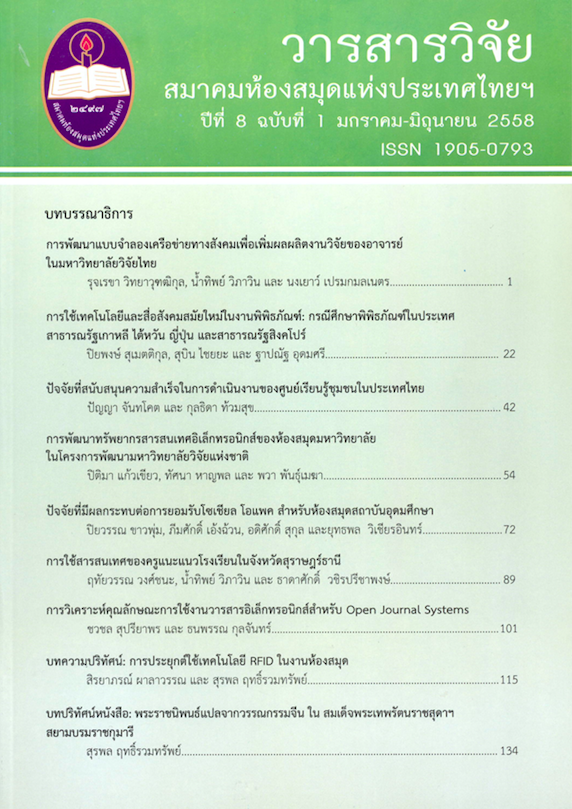การพัฒนาแบบจำลองเครือข่ายทางสังคมเพื่อเพิ่มผลผลิตงานวิจัย ของอาจารย์ในมหาวิทยาลัยวิจัยไทย
Main Article Content
Abstract
การวิจัยนี้เป็นการศึกษาเครือข่ายทางสังคมในแง่ของความร่วมมือด้านการวิจัยและความเป็นผู้แต่งร่วมที่เอื้อต่อการผลิตผลงานวิจัยของอาจารย์ในมหาวิทยาลัยวิจัยไทย และพัฒนาเป็นแบบจำลองเครือข่ายทางสังคมที่เหมาะสมต่อการเพิ่มผลผลิตงานวิจัยของอาจารย์ในมหาวิทยาลัยวิจัยไทย
วิธีการวิจัยใช้วิธีแบบผสมผสาน กลุ่มตัวอย่างเป็นอาจารย์ในมหาวิทยาลัยวิจัยไทย จำนวน 82 ราย ที่คัดเลือกแบบเจาะจงจากอาจารย์ในมหาวิทยาลัยวิจัยไทย จำนวน 9 แห่ง ที่มีผลผลิตงานวิจัยสูงสุดในสาขาวิชาต่าง ๆ จำนวน 26 สาขาวิชาจากฐานข้อมูลสากล Scopus เครื่องมือที่ใช้ในการวิจัย ได้แก่ แบบสำรวจสภาพผลงานวิจัย แบบสำรวจผู้แต่งร่วม และแบบสัมภาษณ์เชิงลึกแบบกึ่งมีโครงสร้าง การวิเคราะห์ข้อมูลเชิงปริมาณใช้วิธีการทางบรรณมิติ การวิเคราะห์ข้อมูลสัมภาษณ์เชิงลึกใช้วิธีการวิเคราะห์เนื้อหาแบบอุปนัย
ผลการวิจัยพบว่า ผู้แต่งร่วมที่ผลิตผลงานวิจัยร่วมกับอาจารย์ในมหาวิทยาลัยวิจัยไทย มีจำนวน 14 ประเภท ผู้แต่งร่วมที่มีความสำคัญสูงสุด ได้แก่ อาจารย์มหาวิทยาลัยวิจัยไทย นักศึกษาปัจจุบัน ศิษย์เก่าซึ่งปัจจุบันเป็นอาจารย์ และอาจารย์มหาวิทยาลัยต่างประเทศ แบบจำลองเครือข่ายทางสังคมที่พัฒนาขึ้นประกอบด้วยปัจจัยที่เกี่ยวข้องกับเครือข่ายทางสังคมทั้งในแง่ของความร่วมมือด้านการวิจัยและความเป็นผู้แต่งร่วมซึ่งเอื้อต่อการเพิ่มผลผลิตวิจัย จำนวน 7 ปัจจัย ปัจจัยที่มีความสำคัญที่สุด ได้แก่ ความสัมพันธ์ส่วนตัวระหว่างบุคคล และลักษณะเฉพาะบุคคลด้านความสัมพันธ์ ปัจจัยที่มีความสำคัญรองลงมา ได้แก่ สาขาวิชาหรือหัวข้อวิจัย ความเข้าใจวัฒนธรรมวิจัยของชาวต่างประเทศ ระบบและกลไกของสถาบัน แหล่งเงินทุนวิจัย และเครื่องมือวิจัย ปัจจัยแห่งความสำเร็จที่ส่งผลต่อการผลิตผลงานวิจัยโดยตรง มี 4 ปัจจัย ปัจจัยที่สำคัญที่สุด คือ ลักษณะเฉพาะบุคคลด้านความสำเร็จ ปัจจัยที่มีความสำคัญรองลงมา ได้แก่ ความสามารถในการใช้ภาษาอังกฤษและทักษะในการเขียนบทความเพื่อการตีพิมพ์ การบริหารจัดการเวลา และคุณภาพของนักศึกษา
The Development of a Social Network Model to Enhance Research Productivity of Faculty Members in Thai Research Universities
Ruchareka Wittayawuttikul1, Namtip Wipawin 2, Nongyao Premkamolnetr3
1 Ph.D. Candidate in Information Science, Department of Information Science, Faculty of Liberal Arts, Sukhothai Thammathirat Open University / Senior Information Specialist, Faculty of Science, Mahidol University
2 Ph.D. (Library and Information Studies), Associate Professor, Department of Information Science, Faculty of Liberal Arts, Sukhothai Thammathirat Open University
3 Ph.D. (Information and Library Studies), Deputy Executive Director, Knowledge Network Institute of Thailand
This study investigated social networks in terms of research collaboration and co-authorships that related to research productivity of faculty members in Thai research universities and developing a viable social network model to enhance research productivity.
This study employed mixed methods of research. The population consisted of faculty members from 9 research universities in Thailand who were the most prolific authors from 26 subject categories classified according to the Scopus Database. Purposive sampling was used to select 82 participants. The instruments used were publication survey form, co-authorship survey form and semi-structured in-depth interview guide. Publication data were quantitatively analyzed using a bibliometrics approach. In-depth interviews were qualitatively analyzed using an inductive content analysis.
The research findings showed that there were 14 types of co-authorships. The most important co-authorships were faculty members from Thai universities, current students, alumni who became faculty members, and faculty members from foreign universities.
The viable social network model which enhances research productivity was comprised of 7 factors relating to research collaboration and co-authorships. The most important factors were as follows: the personality traits of the faculty members and the personal relationships with their co-authors, research fields or research topics, understanding research culture of foreign researchers, institutional systems and mechanisms, research funding amounts, and research equipment. There were 4 success factors directly related to research productivity. The most important factor was the personality traits of the faculty members, followed by English language proficiency with technical writing skills, time management, and quality of students.
Article Details
บทความทุกเรื่องที่ลงตีพิมพ์จะได้รับการตรวจอ่านโดยผู้ทรงคุณวุฒิ ความคิดเห็นและบทความที่ปรากฏในวารสารนี้ เป็นของผู้เขียนซึ่งมิใช่เป็นความคิดเห็นของคณะผู้จัดทำ และมิใช่ความรับผิดชอบของสมาคมห้องสมุดแห่งประเทศไทยฯ การนำบทความในวารสารนี้ไปตีพิมพ์ซ้ำต้องได้รับอนุญาตจากคณะผู้จัดทำ
All articles submitted for publication will be reviewed by the academic reviewers. The editorial board and TLA claim no responsibility for the content or opinions expressed by the authors of individual articles or columns in this journal. Reprinting of any articles in this journal must be permitted by the editorial board.


